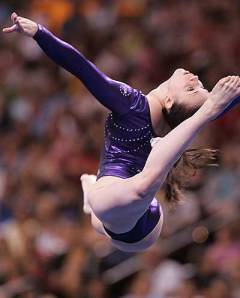 Like many other sports fans, I am eagerly waiting the women’s gymnastics competition at the 2008 Summer Olympics. As I saw in person a few weeks back, the US women’s team expects to be quite competitive, as the senior championships demonstrated such an amazingly high level of competition. Despite the great performances at the Visa US Championships, no members of the Olympic team were named after the competition ended – just all but four of those who competed advanced to the Olympic Trials, held this past weekend in Philadelphia.
Like many other sports fans, I am eagerly waiting the women’s gymnastics competition at the 2008 Summer Olympics. As I saw in person a few weeks back, the US women’s team expects to be quite competitive, as the senior championships demonstrated such an amazingly high level of competition. Despite the great performances at the Visa US Championships, no members of the Olympic team were named after the competition ended – just all but four of those who competed advanced to the Olympic Trials, held this past weekend in Philadelphia.
But was an Olympic Team for Women’s Gymnastics named after this weekend? Oh no. Two gymnasts – Shawn Johnson and Nastia Lukin – were “guaranteed” spots on the team, but four spots and three alternates still remain open. These team members will be determined in a “selection camp” held on a private ranch in Texas owned by the King and Queen of Modern Gymnastics, Bela and Marta Karolyi. This camp will be closed off from the public and media, and will be held in late July. The Olympic Games begin two weeks later.
Try explaining this to the regular Olympics fan, one who follows gymnastics only once every four years. In the age of voyeurism, an Olympic Team will be selected based on a committee of three people, during events held in front of no audience. You’ve held two competitions within two weeks of each other, and you can not determine the six best gymnasts to make up your Olympic Team? Meanwhile, other sports are determining their Olympic Teams, as well as other nation’s gymnastics teams are being finalized. And the US Team, the most dominant nation in the sport of women’s gymnastics at the moment, will be determined two weeks before the games behind completely closed doors.
The result of this camp may not be fair to the gymnasts and their coaches. For example, those of you who have read Little Girls in Pretty Boxes (which was one of those books I read as a teenager that solidified my former dream of being a sports journalist) remember the haunting account of Kim Kelly, a gymnast aiming for the 1992 Olympic team. Kelly was passed over during a closed-doors selection event for gymnasts with serious back and leg injuries, gymnasts who ended up not being able to compete once they got to the Olympics, because Kelly wasn’t from a “name” gym, her coaches were deemed not to have the same level of international pull as others, and she was a tad older than her teammates. That type of selection process and that type of result isn’t fair to the principle of the Olympic Games, which reward the best of amateur athletics and revel in the opportunity of the unknown athlete to impress a global audience.
But the bigger problem with this process to me is from a sports marketing standpoint. While NBC and it’s boatload of networks are showing even the most obscure of Olympic team trials, the selection process for the biggest of all Summer Olympic sports will take place away from the view of cameras and the viewing public. The every-four-years fan, who passed by the Olympic Trials while channel-surfing this weekend, must be confused as all get out at why a team wasn’t named at the end of NBC’s coverage on Sunday evening. Although the commentators attempted to explain this process over and over, the full explanation was not clear. In such a voyeuristic society, with a multitude of media platforms, gymnastics officials will take their sport and hide it away, creating an air of mystery around their team. From a marketing standpoint, this is absurd! Your sport struggles mightily for viewers in non-Olympic years, and the one year that you are going to get viewers, you confuse them with a unclear and subjective team selection process, and then don’t allow the final team selection to be televised, or even reported on!
USA Gymnastics, do you want to make your sport irrelevant in this age where most Olympic sports are fighting for viewers and attention? If you do, you are doing a great job of it.
I agree with what you’re saying about it making impossible to cheer for a sport where 1) you can’t understand the judging system and 2) you have no idea how the Olympic team is chosen. However, I have to point out that the Olympics are not to reward the best of amateur athletes anymore. Not since 1988 when professional athletes were first allowed to compete and ushered in the era of “Dream Teams” Granted, a majority of Olympic athletes are still amateur, but with the endorsements they receive even that label is a little ambiguous.
“A few years later, the U.S. began using professional athletes at the Games – Dream Teams. I always found that term ironic because now that we have Dream Teams, we seldom ever get to dream. But on one weekend, as America and the world watched, a group of remarkable young men gave the nation what it needed most – a chance, for one night, not only to dream, but a chance, once again, to believe. ” ~ Miracle. Wouldn’t it be great if the Olympics could do this again? To allow people to dream?